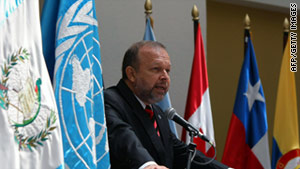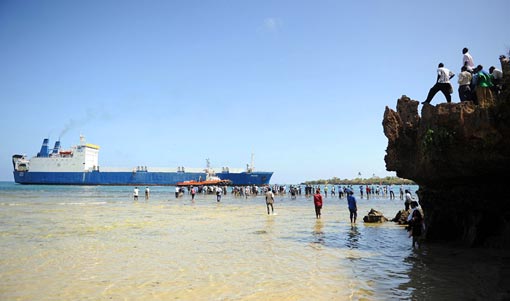Guatemalan Fugitive and Former Interior Minister Re-Arrested in Spain for extra-judicial killings
By Erica Laster Impunity Watch Reporter, North America
GUATEMALA CITY, Guatemala – Spanish authorities re-arrested Former Interior Minister Carlos Vielmann in Spain on Thursday for the second time this month. Vielmann is wanted in connection with the execution of prisoners at El Pavon Prison in Guatemala, extrajudicial killings and the murder of case witnesses. Evidence suggests that the murders were not the result of a vicious gun battle, but a carefully staged execution.

After Guatemalan authorities were unable to capture Vielmann, Spanish authorities arrested him on the basis of a Guatemalan warrant. 40 days later, authorities were forced to release him because of lack of an extradition request.
In 2006, 7 inmates were killed at El Pavon prison immediately preceding a raid where authorities were thought to have discovered corruption among inmates. Authorities later discover that top officials and prison personnel were involved in illegal and illicit activities including drug trafficking and prostitution. Guatemalan authorities are also seeking his arrest in connection with the killing of 3 escaped inmates located at El Infiernito prison in 2005.
The UN backed group, International Commission Against Impunity in Guatemala, spearheaded the effort to bring down the former Interior Minister after discovering his involvement. New photographic evidence shows Vielmann standing next to prison officials the day of the uprising. Further photographic evidence shows that some prisoners were redressed and moved after being executed.
A report by the Guatemalan Human rights Ombudsman’s Office and new physical evidence tracks the fate of various inmates. One inmate was shown shot to death with no bullet holes in his clothing, suggesting that he was shot while naked and redressed to cover the execution.
“There are no super-citizens that are above the law,” says Francisco Dall’Anese, head of the International Commission Against Impunity in Guatemala. Vielmann was arraigned Thursday after turning himself into authorities, charged with murder, crimes against humanity and released on $132,000 bail.
For more information, please visit:
CNN – Fugitive Guatemalan Official Re-arrested – 17 December 2010
CNN – Photos Provide Evidence In Guatemalan Killings Case, Officials Say – 15 December 2010
CNN – Spain Re-arrests Ex-Guatemalan Minister – 16 December 2010
According To Justice Minister, Chilean Prison Conditions “Subhuman”
By Patrick Vanderpool
Impunity Watch Reporter, South America

SANTIAGO, Chile – Monday, Justice Minister Felipe Bulnes called the overcrowding of Chilean prisons, which lead to the deadliest prison fire in the country’s history, “subhuman.” Overcrowding in penitentiaries was officially recognized as a primary cause of last Wednesday’s fire that burned part of the capital’s San Miguel Prison and killed 81 prisoners.
The San Miguel Prison currently houses approximately 1,900 people, double its intended capacity. This overcrowding can be seen in almost every jail in Chile. Chile’s prison population totals approximately 54,000 people; however, it’s infrastructure only has the capacity for 34,000 people.
Bulnes was quoted on a Chilean television network as saying, “of course we need more jails, because it would allow us to separate and rehabilitate. With rates of overcrowding like this, conditions are subhuman, an indignity.” He also admitted the need to purge the Gendarmeria, the Chilean prison service, in response to accusations by inmates’ families that guards regularly accept bribes to bring drugs, cell phones and other prohibited items into the prisons.
Jaime Pincheira, the prison warden Calama, a city in Northern Chile, has denied reports that 500 inmates began a hunger strike Sunday in solidarity with the families of the San Miguel victims. Pincheira told local reporters that only 200 of the prisoners there are fasting, some 40 percent of the prison population.
In a report on prison conditions last year, Supreme Court attorney Monica Maldonado found that some prisons have potable water only a couple of hours a day, a hundred prisoners share one usually infested toilet and the population in some jails easily doubles their capacity.
President Sebastian Pinera has responded to the recent criticisms and deaths by announcing a $460 million plan to improve conditions for Chile’s prisoners. The plan includes purchasing prefabricated modular prisons for minimum-security inmates to help reduce overcrowding in the country’s prisons.
The courts are currently investigating claims that prison police in San Miguel waited an hour before calling the fire department while 81 inmates suffered burns and smoke inhalation.
For more information, please see:
Global Post – The Story Behind Chile’s Prison Fire – 15 December 2010
Latin American Herald Tribune – Chilean Official: Prison Inmates “in Subhuman Conditions” – 13 December 2010
Associated Press – New unrest at Chile prison where 81 inmates died – 11 December 2010
Sri Lankan ‘War Criminal’ Gets U.N. Diplomatic Immunity
David L. Chaplin II
Impunity Watch, Asia
COLOMBO, Sri Lanka – Suspected Sri Lankan ‘war criminal’, Shavendra Silva, former top military commander, played an alleged key role in the slaughter of 40,000 civilians and is also accused of clipping down separatist political group leaders, killed at gun-point, in the midst of surrender; now sits in a pool of full diplomatic immunity at the United Nations. The Srilankan government has expressed no interest in holding this human rights abuser accountable, as evident with their latest appointment of a war criminal as ‘deputy permanent U.N. representative’.

“Thousands were killed or starved. There were massive human-rights violations and he’s the No. 1 suspect,” said the investigator, a human-rights group expert who asked not to be identified.
Now, the UN panel has a war criminal, a man with first-hand knowledge of the slayings, coming into the UN to represent Sri-Lanka.
Human-rights groups are outraged that Shavendra Silva, 46, a top ex-military commander, was named Sri Lanka’s deputy permanent U.N. representative in August, after which he moved to New York.
His arrival came a year after his troops defied international pleas and shelled a no-fire zone packed with women, children and elderly refugees, according to observers.
“It’s a slap in the face,” said an investigator familiar with Silva, who last year oversaw the final months of a brutal 26-year civil war against Tamil separatists on the island nation off India’s southeastern tip.
The war started in 1983 after the Tamils, a Hindu ethnic minority, were denied power by the ruling Sinhalese, Buddhists, and formed a violent resistance group, the Tamil Tigers.
Maj. Gen. Shavendra Silva’s presence in New York coincides with U.N. Secretary-General Ban Ki-moon setting up a panel of experts to advise him on accountability for human rights violations during the final stages of the conflict in Sri Lanka.
It was after the New York Times published an article critical of the Sri Lankan Government’s appointment of Major General Shavendra Silva as the Deputy Permanent Representative to the UN that a journalist questioned the acting Dpt. Spokesman of UN Chief Ban Ki-Moon whether Silva will be interviewed by the expert panel.
The United Nations Secretary-General Ban Ki-moon appointed a panel of experts to advise him on Sri Lanka’s alleged violations of human rights and humanitarian law during the last stages of the war against LTTE.
He was further questioned on whether the final report of the findings of the Expert Panel will be made public, the Farhan Haq, Acting Deputy Spokesperson for the Secretary-General said that, “We’ll have to see. As you know, it is an internal body, but it will be up to the Secretary-General to determine what he makes public once he received that information.”
In a phone interview from London, Mr. Keenan said it appeared to be more than a coincidence that Gen. Silva would be appointed to the mission in New York at the same time as Mr. Ban set up the panel of experts.
“So it seems fair to assume that he is trying to influence it, which is the right of the Sri Lankan government. But I think that is disturbing that someone who himself was involved in the very incidents that the U.N. has begun looking into should have any chance to influence the panel’s operations,” Mr. Keenan said.
For more information, please see:
The Washington Times – Sri Lankan war crimes suspect get post as representative to U.N. – 5 December 2010
Live Lanka – UN not sure whether Expert Panel will interview Shavendra Silva – 11 December 2010
FOX news – ‘War criminal’ gets a UN job – 21 November 2010
Free Malayasia Today – ‘War Criminal’ gets a UN job – 8 December 2010
WikiLeaks Exposes Southern Sudan Arms Deal
By Daniel M. Austin Impunity Watch Reporter, Africa

KHARTOUM, Sudan – The website WikiLeaks has released diplomatic cables describing the hijacking of a merchant ship in the Gulf of Aden by Somali pirates in September 2008. This act of piracy was especially alarming because the merchant ship was transporting a large arms shipment destined for southern Sudan. The cables go on to describe both the contents of the arms shipment and the Kenyan government’s role in helping to deliver the weapons to southern Sudan.
The merchant ship attacked by Somali pirates was the MV Faina, a Belize flagged Ukrainian tanker. According to the cable, the merchant ship contained a huge arms shipment including 33 T-72 tanks, 42 anti-aircraft guns, 36 rocket-propelled grenades, six rocket launchers and 13,000 125mm rounds of ammunition. The MV Faina was bound for Kenya when it came under attack. U.S. diplomats believed that if the cargo landed in Kenya, the arms would have been off-loaded onto rail cars and transported through Uganda to Juba, Sudan. U.S. officials claim an earlier arms shipment, that included tanks, was delivered to southern Sudan along the same route.
In early 2009, the MV Faina was released after a $3.2 million (U.S. dollars) ransom was paid. After being freed, the MV Faina traveled to Kenya and unloaded its cargo. The tanks and other weapons still remain in Kenya and have not been transported outside of the country. The Wikileak’s cables also describes how diplomats and military commanders in the United States were contemplating a military strike on the MV Faina in order to prevent the weapons from falling into the hands of al-Shabab, an Islamic militant group operating in Somalia.
Along with detailing the arms shipment, the diplomatic cables illuminate the work of U.S. diplomats in Africa. Specifically, the cables describe the United States tacit approval of Kenya’s effort to supply weapons to southern Sudan during the Bush administration. However, when President Obama took office in 2009, his administration reversed course and became much more critical of Kenya’s actions.
The release of these sensitive diplomatic cables is coming at a crucial time for Sudan. On January 9, 2011, a referendum will be held to decide whether southern Sudan will break away from the north and become an independent state. The referendum was part of a peace deal negotiated in 2005 after 50 years of civil war.
For more information, please see:
Associated Press — US considered military action on pirated arms ship –- 10 December 2010
BBC Africa – Wikileaks: US ‘aware of’ Kenya-Southern Sudan arms deal – 9 December 2010
New York Times — Pirates’ Catch Exposed Route of Arms in Sudan – 8 December 2010
The Christian Science Monitor — WikiLeaks documents roil Nigeria, Kenya, and South Africa – 9 December 2010
Voice of America — Leaked Cables Detail Kenya’s Role in Arming South Sudan – 9 December 2010